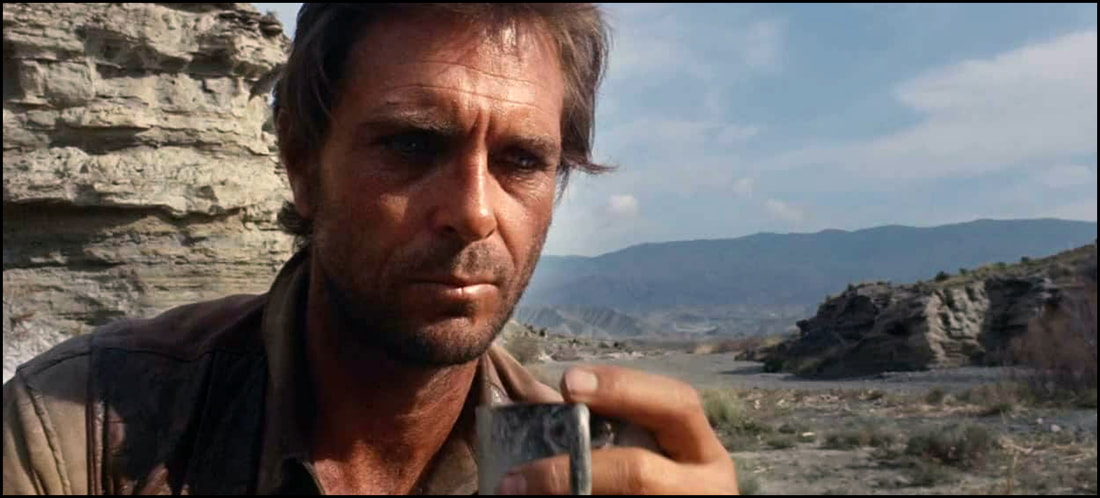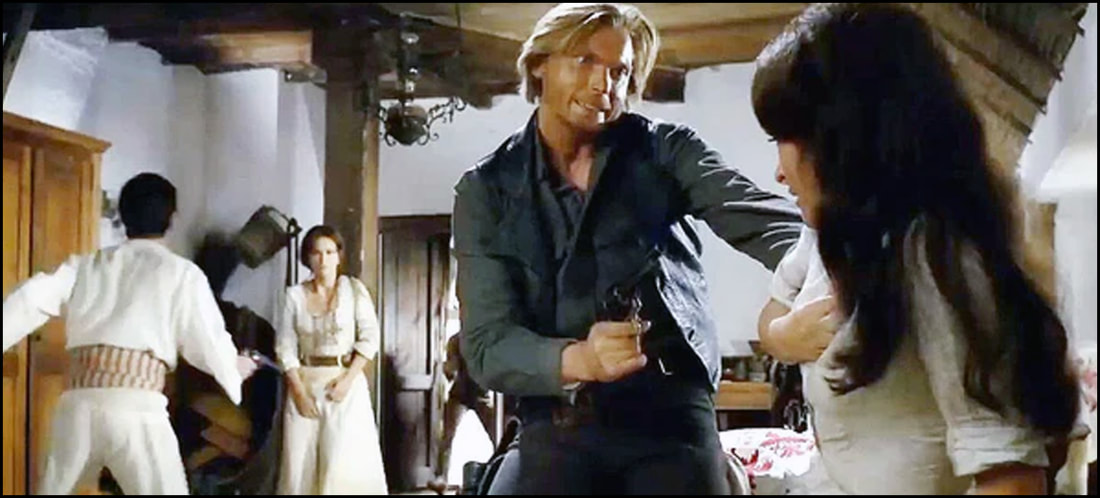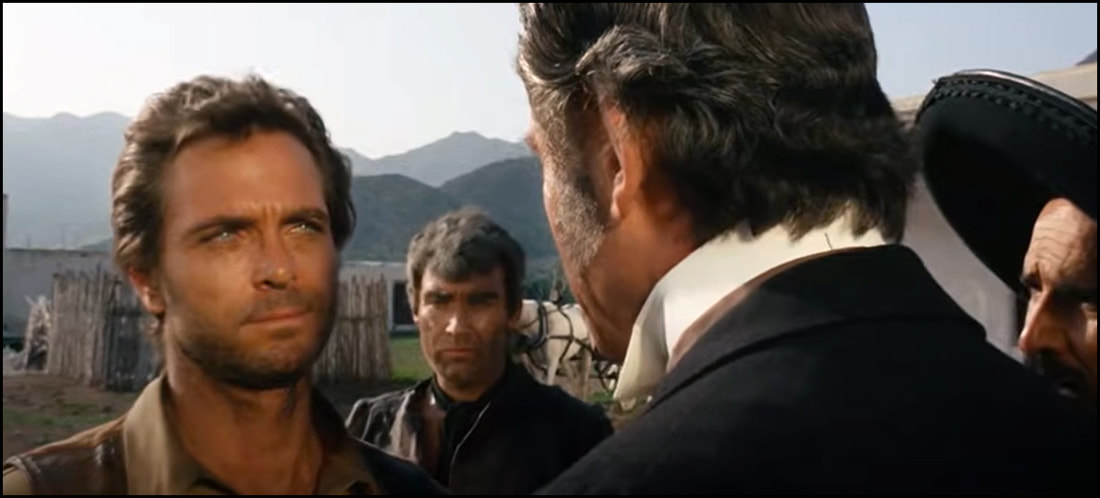As I’ve mentioned, I’ve always been a lover of film – as a whole – and not just those which happen to fall into the Science Fiction, Fantasy, and Horror genres. While I’m not all that much moved by conventional Dramas and Comedies, I still take them in on occasion, especially those that have been recommended to me from the kind folks I meet along the merry journey called life. Westerns and Film Noirs are also big, big, big favorites of mine (you’ll see a smattering of columns and reviews on the site covering them); but I do tend to turn my nose up with Musicals. (I just never cared for them.) And when one of these flicks inspires me to think and write about it a bit more, then I’m also apt to cover new releases of them – with the occasional review – in this space because venturing outside my preferred bubble is a solid act of creative renewal. I get to ponder questions that stretch beyond spaceships, aliens, and ray guns; and there’s nothing wrong with pushing one’s brain in a different direction entirely.
Simply put, it’s good for the soul.
Today’s diversion: 1968’s I Want Him Dead, a Spaghetti Western – if ever there were a Spaghetti Western – that’s not only quite good but also tries to do something a bit more interesting with the story than usually seen in such Italian imports. Directed by Paolo Bianchini from a story by Carlos Sarabia (believed to be a pseudonym), the film starred Craig Hill as a gunslinger seeking vengeance over the death of his sister at the hands of a pair of uncompromising baddies. While he’ll stop at nothing to see justice served, the gunman also curiously demonstrates a rare measure of restraint not usually seen in these European oaters, suggesting that there’s a bit more to his upbringing and the resulting moral compass than audiences are typically shown. This makes the film as quintessentially Spaghetti as it is something beyond … a breath of fresh air from the plains normally rich with dust.
(NOTE: The following review will contain minor spoilers necessary solely for the discussion of plot and/or characters. If you’re the type of reader who prefers a review entirely spoiler-free, then I’d encourage you to skip down to the last few paragraphs for the final assessment. If, however, you’re accepting of a few modest hints at ‘things to come,’ then read on …)
From the film’s IMDB.com page citation:
“Clayton’s sister is raped and murdered. Time for lethal revenge!”
It's been my experience that the majority of Spaghetti Westerns have this chronological opaqueness to them. They take place within the general era of the American West (usually dated as 1860 – 1900), but they’re rarely tied to a specific moment – day, month, year, etc. – and instead just happen when the days were wild, if not the wildest. Calm existed only for the purpose of being disrupted, and it was into this steaming cauldron that these characters were inserted, heavily armed, and did the greatest damage, leaving behind the highest casualty numbers imaginable. These violent flourishes often made the flicks what they were, giving audiences a glimpse at a hard life from the days truly gone by.
Now, I Want Him Dead certainly exists in this kinda/sorta Dystopian state, but its script actually posits in a few ways that there’s something more waiting in the wings.
In fact, Dead falls dead center into what appears to be the closing days of the American Civil War. There are conversations going on between Union and Confederate officers – subordinates to General Ulysses S. Grant and Robert E. Lee – to bring about the ultimate cessation of hostilities, one that will involve both disarmament and the re-introduction of soldiers into their roles as peaceful civilians. These peace talks are at the crux between both the Union and the Confederacy just as they hint that there is a life waiting for our lead gunslinger Clayton (played by Craig Hill) … if he can just survive long enough to find it.
Into this backdrop, Sarabia’s script posits that landowner and local business magnate Mallek (Andrea Bosic) is secretly pulling strings behind-the-scenes to keep the war fires burning. He’s personally profiting off the sale of weapons and ammunition to both sides of the conflict, and the end to such a lucrative undertaking would leave him and his partners shackled with inventory and no one willing nor able to purchase it (Southerners would’ve been prohibited from buying rifles as per the conditions of peace). This nuanced examination of economics alone puts Dead into some rarified air alone – especially when compared with other efforts – but, inevitably, Mallek does wind up being a fairly stereotypical ‘capitalist pig’ before all is said and done.
Also there’s the heavy suggestion that Clayton isn’t your typical gunfighter. While he’s arguably the fastest on the draw when it matters most, he also demonstrates that maybe killing isn’t always necessary. On multiple occasions, he shoots an adversary’s hand or arm in an obvious attempt to disarm an enemy, so perhaps he isn’t shackled with the usual grim dedication to simply filling the next cemetery plot on Boot Hill. He pursues the nefarious Jack Blood (José Manuel Martín) for the crime he committed, but it becomes increasingly clear that – while Clayton’s on his personal ride for justice – he’s not interested in accepting collateral damage unless afforded no other choice. Again, these sentiments weren’t always the case in this genre, and their inclusion here gives Dead evidence that “the times, they are a’changin’.”
Beyond just the elimination of wartime, Clayton’s life is peppered with other hints of an achievable paradise. His eyes are set on a parcel of land to make all of his own – one he initially set out to share with his sister before Fate intervened – and, as the story unfolds, there’s even the prospect of love from a good woman: Aloma (the lovely Lea Massari) is both willing and able to settle down with him after having eked out a dire existence in the harshest of frontiers at a time when women were practically disposable. But because there is a promised silver lining to these dark clouds – something exceedingly rare in such spaghetti pursuits – Dead easily feels like it was trying in part to turn the corner from the usual screen fare.
I Want Him Dead (1968) was produced by Centauro Films, Inducine, and Rewind Film. DVD distribution (for this particular release) has been coordinated by the fine folks at Arrow Films. As for the technical specifications? While I’m no trained video expert, I thought that the sights-and-sounds to this reported all-new 2K restoration (from the original camera negative) were fabulous: there were a few sequences with a fair amount of grain, but it was nothing that seriously detracted from the quality of the experience. Lastly, if you’re looking for special features? The disc boasts several interviews with crewmembers (no cast) along with a theatrical trailer, an image gallery, and an audio commentary hosted by Adrian J. Smith and David Flint. It’s a very solid collection, and the commentary is very interesting though a bit light on this film’s specifics.
Highly recommended.
Some may disagree, but I thought that I Want Him Dead (1968) showed that filmmakers were starting to think a bit outside of the box when it came to delivering Westerns that both fit the mold but also transcended the formula is ways that showed stories were evolving as were the times they depicted. Actor Craig Hill makes for a believable force for good just as much as he’s depicted as a man who wants to get beyond what’s expected of him in an otherwise bleak existence. Rarely do you get exactly what you want – with a side of something deliciously unexpected – but it works just fine here for those smart enough to recognize it on screen.
In the interests of fairness, I’m pleased to disclose that the fine folks at Arrow Films provided me with a screener Blu-ray copy of I Want Him Dead (1968) as part of their Savage Guns: Four Classic Westerns collection by request for the expressed purpose of completing this review. Their contribution to me in no way, shape, or form influenced my opinion of it.
-- EZ




 RSS Feed
RSS Feed